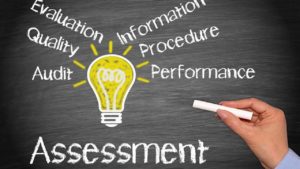Do you sometimes wonder if you could be doing a better job administering your team’s performance appraisals? You’re not alone. If you are a new business owner or first-time manager, you may have a lot of questions about how to best conduct performance evaluations. And if you’re leading a growing company or evolving team, there’s a good chance your performance appraisal process could use some improvement.
Most of us don’t go into business or step into the workforce knowing how to evaluate employees in a way that produces the desired outcomes. We understand that employees are resources to be leveraged for the company’s growth, but also know that they are human first and resources second.
People are not robots. You can’t just program them to do each task at hand like a machine. The good news is they are far more complex and more capable than that. Given strong leadership, guidance, and processes to follow, your team can and will be your greatest asset.
As an employer or manager, it is up to you to ensure that the performance appraisals you conduct serve as both a practical and motivational exercise with a clearly defined process designed for results.
Download your FREE HRAnswers.org Performance Evaluation Toolkit Here. It includes a Performance Appraisal Program Checklist, Sample Policy, and Sample Introductory Period Evaluation Form.

In my role as a human resources consultant, I often share the following 8 Tips on How to Conduct Effective Performance Appraisals:
1) Develop a Strategic Plan
Putting an effective performance appraisal process in place requires careful strategic planning in advance. Employee performance can make or break your company’s success, so it is not something to take lightly nor is it an exercise in which you should be satisfied with just going through the motions.
You’ll need to craft a policy, create forms, select tools, develop a schedule and rollout plan, and provide training for managers. Careful planning will save you time, money, and headaches, as well as increase positive outcomes.
2) Communicate Clear Expectations
Long before the performance appraisal meeting is on the calendar, all employees should know exactly what’s expected of them in their role and they should know precisely how they will be evaluated. Everything runs more smoothly when people know what to do and the specific ways in which their performance will be measured.
Keep in mind, the performance appraisal does not start with the evaluation form or the performance review meeting. It begins with performance planning so everyone is on the same page from the start.
3) Come Prepared
If you want to conduct an effective performance appraisal, you owe it to your team to take it as seriously as you expect them to take their job. Remember, their career is on the line and success hangs in the balance, so show them the respect of arriving prepared.
Read previous evaluations, go over relevant documentation, and conduct necessary research in advance. You never want to overlook improvements or declining performance because you didn’t give the evaluation the necessary attention and preparation.
4) Be a Coach
Remember, delivering a performance appraisal is not “discipline”. The performance appraisal process is your opportunity to foster growth within each individual employee that will lead to healthy growth within the organization. Help employees identify areas of potential personal and professional development that will enable organizational growth and development.
Encourage employees to recognize limits, challenges, and potential solutions. Work with employees to develop achievable goals and steps to reach those goals. It should be a collaborative and mutually beneficial effort.
5) Give Specific Feedback
It is critically important to be honest and direct. All of your feedback should be more constructive than critical, but it is not the place to shy away from confronting issues that need to be addressed.
If you’re meeting with a strong performer, focus on their strengths and avoid unnecessarily pointing out weaknesses that are not relevant to their performance. If you are meeting with a poor performer, use the meeting time to set demands for improvement. Either way, if there are specific behaviors you want the employee to start, stop, or continue, communicate your expectations clearly.
6) Be Confident and Firm
Performance evaluations can be an emotional process. Some employees are more self-motivated than others, some are more skilled and capable than others, and some lack the self-awareness or emotional intelligence to recognize where they stand with you.
When appropriate, I advise that you provide a written copy of the review in advance so employees will have their initial emotional response prior to the meeting and have the opportunity to arrive prepared for discussion. However, while it is important to respectfully consider their reaction and concerns, remember that you are in charge of the evaluation. If you have done your job well, you should be prepared to confidently defend your assessment and hold your ground when challenged.
7) Document Everything
The entire performance appraisal process should be well documented end-to-end. From the policies and procedures to the training manuals, schedules, and evaluation forms, everything should leave an easy-to-follow paper trail.
Keeping proper documentation and records at your fingertips will not only help keep your business protected when disputes arise, it will also help establish and maintain a positive culture and overall sense of fairness that increases employee retention, job satisfaction, and performance.
8) Audit Your Performance Appraisal Process
As with all business processes, your performance appraisal process should be subject to continuous evaluation and improvement.
- Is the process running smoothly?
- Is all paperwork in order?
- Are you meeting your deadlines?
- Are your employees improving their performance?
- Is the company reaching its organizational development goals?
We all want to feel good about you performance appraisal process. Take a step back and make sure the process is running as smoothly and effectively as possible by conducting annual audits of your system and tools, and revisiting your strategic plan. Successful companies align their performance appraisal system with organization goals and objectives.

Be mindful, employee performance management is an important part of overall organization management. A performance evaluation provides a platform for discussing, planning and reviewing the performance of each employee. Performance evaluations have the ability to influence salaries, promotions and transfers. For this reason, it is critical that leaders be objective in conducting performance reviews and in assigning overall performance ratings.
About the Author
Niki Ramirez is the Founder and Principal Consultant at HRAnswers.org a firm dedicated to providing impactful yet practical human resources advice and organizational development support to businesses of all sizes. Niki is a dual-certified HR professional with experience spanning over 20 years, including: serving in operational leadership roles, adjunct business faculty member, and as a human resources executive. Niki carries with her a strong desire to educate and empower employees and their leaders to work in partnership to design and implement meaningful human resources programs that drive the success of their organizations.
Does your organization need support with developing a customized performance appraisal and evaluation process? Contact us for one of the following solutions:
- Schedule a Workshop (Available In-person or Online):
- Designing a Performance Appraisal System that Works
- Conducting Effective Performance Appraisals
Hire us for Human Resources Consulting.



